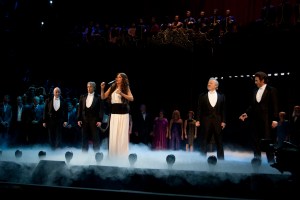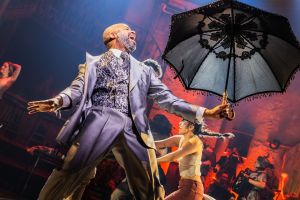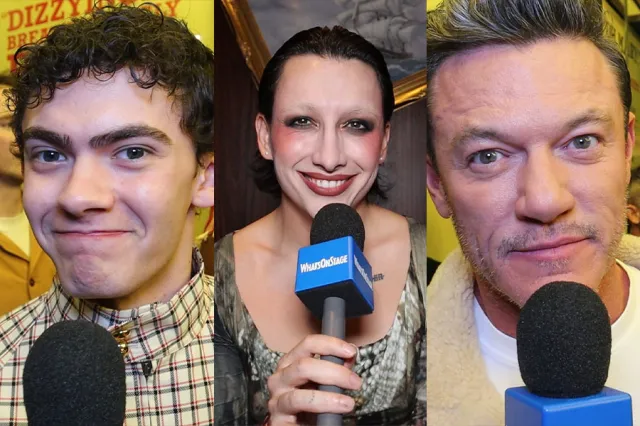20 Questions with… David Kramer
South African writer/director David Kramer, whose Olivier Award-winning musical Kat & the Kings is now back in London, shares his views on theatre, politics & AIDs in his native land & explains why he’d like to be Cameron Mackintosh for a day.
David Kramer started his career as a singer/songwriter in his native South Africa, performing satirical songs at folk clubs and campus concerts in the early 1980’s.
He sung in English and Afrikaans and, when he released his first album Bakgat! in 1980, it was banned for its political message. Despite getting no airplay initially, Kramer received a very strong response from audiences and by the mid 1980’s had been awarded ten gold records and one platinum for sale of his albums.
In 1985 Kramer teamed up with the late Barney Simon, creative director of the Market Theatre in Johannesburg, a relationship that led to Kramer’s first musical. Together with Taliep Petersen, he has written five other musicals, three of which have toured internationally.
During the past two years, Kramer has also directed two one-man shows starring Marc Lottering, and in June 2002, he performed a retrospective of his work at London’s Tricycle Theatre. More recently, he directed his musical, District Six, at the Baxter Theatre in Cape Town. Kramer has recently completed a children’s play and is currently writing new songs and a musical called Royal Hotel.
Kat and the Kings has been performed on the West End and on Broadway, and won the 1999 Olivier Awards for Best New Musical and Best Actor in a Musical (awarded, uniquely, to the entire company). It is currently playing at the Tricycle Theatre until 8 February 2004.
Date & place of birth
I was born on 27 June 1951 in the Western Province of the Cape in South Africa.
Lives now in…
I live in Cape Town in the suburb of Camps Bay, and in London, I’ve been staying with the director of the Tricycle Theatre, Nicolas Kent, in St John’s Wood.
Training
At school I was interested in art as well as science and maths. I had no idea what I wanted to do, though I knew I loved music, but that didn’t seem like a career choice. When I finished my high school, I was looking for some kind of scholarship to study at university and got a bursary from the Department of Water Affairs in South Africa to study civil engineering. But then I had this vision of myself standing on a dam wall somewhere in the Orange Free State wearing a safari suit and light blue socks and a comb stuck in them, and I didn’t think that was me really. I decided that engineering wasn’t for me, so I approached a local textile company who were offering a scholarship to study textiles. And I ended up coming here to Britain, at the age of 19, to study textile designing at Leeds University, and then went back to South Africa where I worked as a textile designer for quite a few years afterwards. Then I went to America in 1977, thinking I might re-settle there. But I was only there for three months and decided I was not going to be happy there, either. And I started to understand how strongly I felt about writing songs, and that the kind I wanted to write were set in South Africa, so I would need to be back there.
First big break
I was still working in textiles when I recorded an album. I met up with a small independent label in Cape Town, called Mountain Records, and we did a deal where we went into it 50/50 – I financed half of it myself, and they put in the other half. We recorded this album that was immediately banned by the SABC (the South African Broadcasting Corporation). It was considered to be a very vulgar album, it was half Afrikaans and half English, and had satirical political comments and they hated it. It was getting no airplay because of the ban, but it was selling really well on the streets. We were distributed through EMI, and they sat up and took notice and brought me up to Johannesburg. They said you must get something on the radio, so I recorded a single. I’d written a song about an old rugby player that was released and went to #1 on the South African charts. That was my big break and changed everything. I became a national name in South Africa, and had quite a few hits after that. I was on the one hand tremendously popular, but on the other being too controversial and banned. At one point, I was the darling of the left-wing campuses, and a few months later also this Afrikaans icon. There was a big tension between those two things.
Career highlights to date
I’ve had many, many career highlights – I’ve had a fantastic time. Being invited to London to perform Kat and the Kings at the Tricycle was a big break for me, and when it moved onto the West End, that was wonderful. A big highlight was when ex-President Nelson Mandela came to see us at the Vaudeville Theatre, and made this fantastic speech at interval and came onstage and embraced us all and said, “You’ve done your country proud!” That was a very emotional moment. And then opening on Broadway with Kat and the Kings was something that had been an unreachable dream and became true, even though it wasn’t an experience I particularly enjoyed, because Broadway is run in such an ugly way. But we got there!
Favourite production you’ve ever worked on
I suppose District Six, the first musical that we wrote and the one that we’ve just revived in South Africa, was particularly important for me, because it really was a crossover point. My songwriting wasn’t just aimed at white South Africans, but I became accepted by coloured and black South Africans, and we made an important contribution at that particular time. That musical in 1987 was a watershed in terms of theatre in Cape Town. It brought new audiences to the theatre, and opened up white Cape Town’s eyes to the issue of District Six. It had become forgotten, and the musical kick-started interest in it again.
I’d met Taliep Petersen, with whom I wrote District Six, as performers quite a few years earlier, and we’ve done six musicals together now. Poison was also a favourite when we did it in South Africa. We also did it here at the Tricycle, where we adapted it for a British situation in a way I didn’t think was successful. But in South Africa we worked on it with young people and did it in schools, where it really had an impact, dealing with the issues of gangsterism and drugs as it did. We also went to Malaysia with it.
Favourite musical writers
I’m geared more towards songwriters and was very influenced by writers like Randy Newman, Paul Simon and Joni Mitchell, who focused on lyrical content. I came to musicals much later in life. Kat and the Kings is particularly close to me because rock ‘n’ roll was my first love, and the early inspiration of Buddy Holly and Chuck Berry comes through in this show. I only decided to write musicals because the late Barney Simon of the Market Theatre in Johannesburg opened my eyes to the fact that I was not necessarily just a recording artist but also a storyteller, and that my songwriting lent itself to characterisation. So with his encouragement, I started to take more interest in musicals. I came here in the 1980s, and it was the time of Andrew Lloyd Webber. I’ve seen a few of his, and grew to love Cole Porter and Sondheim.
How has your background as a performer influenced you as a writer & now director?
It has a huge influence, because I have a lot of empathy with the actors and I’m very aware of the audience. The sense of standing onstage and knowing what that feels like is important: you don’t want to die onstage, you don’t want any dead air or dead moments, and that has made me very conscious that every beat of the show needs to engage the audience. The worst thing for me is to see an audience slumping and sliding away. That’s death!
What’s the best thing you’ve seen on stage recently?
In South Africa, there was an amazing production called Tshepang, a piece of work about baby rape, of which there have been so many cases in South Africa. It was doing that job that theatre does so well – highlighting and dealing with a very serious issue.
What advice would you give to either the British or South African governments to secure the future of theatre?
Theatre here seems to be in a much healthier state than it is with us in South Africa. Although we have had very good intentions with our arts funding, it seems the politicians in charge of it don’t have our best interests at heart. It has got really bad over the last year or so. I’m part of a performing arts collective, and it’s almost as if we have now become enemies with the National Arts Council who give out the money. There needs to be a body that at least can adjudicate who is doing work that needs to be funded. Artists and producers and people in the industry should be able to elect some kind of advisory body to do so. Somehow the people in the government don’t seem too clued up as to who should be getting it. There’s a lot of unhappiness.
If you could swap places with one person (living or dead) for a day, who would it be?
I think I’d quite like to be Cameron Mackintosh for a day. I would like to see what the theatre world looks like through his eyes.
Favourite books
I read a book recently called Act One by Moss Hart that was fascinating. It was written a long time ago. I found it on my mother-in-law’s bookshelf. It had been there for years, but I never noticed it before. I like reading about those kinds of theatrical lives.
Favourite holiday destinations
Living in Cape Town is like being on holiday all the time! So I quite like coming to places like London and New York and seeing what’s on in the theatre.
Favourite websites
My wife is a fan of Whatsonstage.com, and my own personal website ( www.davidkramer.co.za) is a favourite! But I use the internet mainly for email.
Favourite songs of all time
Joni Mitchell’s album Blue contains a lot of great songs. Paul Simon’s “Bridge Over Troubled Water” is a great song, and “The Boxer” is even better – it’s very evocative and descriptive. The thing about songwriting for me is that it’s the art of bringing the bigger picture into complete focus and working in miniature. I think Paul Simon is absolutely brilliant at that sort of thing. Randy Newman’s “Sail Away” also does it.
What initially inspired you to write Kat and the Kings?
It wasn’t inspiration to start with. We’d come back from Malaysia with Poison, and some of the young guys from the cast were then out of work. We didn’t have anything to offer them, so we wondered what we could put together quickly, almost like a cabaret for them, and it seemed obvious to me that four or five young guys could form a vocal harmony group. I also had this idea that had been knocking around in me, of an old man who re-meets his younger self. What would it be like if you met your 20-year-old self again when you were 50? So I used that idea, and when we started to work on it, I talked to another of our performers, Salie Daniels, and realised that the storyline could follow Salie’s life story. He was a youngster on the streets of District Six who had formed a vocal harmony group. Salie did the show at the Tricycle and in the West End, but died in 1999.
Have you been surprised by the show’s international success?
Very surprised! It was originally written just for the people involved and for Cape Town. We never had our eyes on international success, but the reason for it I think is that it’s based on early rock ‘n’ roll and that’s a very global form of music. Whether you’re Japanese or German or American, it’s easy to understand it. And the story is very straightforward and easy to understand, too, though ours has a slightly different flavour.
What’s the most notable thing that’s happened during the show’s various incarnations?
One Saturday afternoon during the original run at the Tricycle I came here, and Salie wasn’t well at all – I think it was the start of his illness – and I found him lying on the floor of his dressing room in great pain. He went on, but during the skeleton dance that he usually does, I got into the skeleton suit and did it for him! Another time, the young woman in the cast couldn’t perform – we had to do the show without that character, and it was very pressurised.
What’s your favourite number from Kat and the Kings?
I like the last number, “My Lucky Day” – the way that Danny Butler sings it now does justice to it. We’ve also got a new number for this production called “Shine”, a ballad that the character of Lucy Dixon sings about not being black and not being white, about being a coloured person, stuck in the middle. Now that we’ve been invited to the Tricycle again, I’ve taken the opportunity to clarify a few things in the show and improve them.
Kat and the Kings highlights many of the difficulties in apartheid-era South Africa. Fifty years on from when it was set, how do you view the country’s future?
I’m very positive about South Africa’s future. I’ve been thrilled with the way the government has pulled the economy together. In all the time I’ve lived in South Africa, I don’t think we’ve had a stronger economy. But at the same time, there are some unnerving things happening. As we go into this century, I think we have to be careful that we don’t swap the situation where we had white dictatorship for black dictatorship. We have a good constitution in place and that’s very reassuring, but for so-called coloured people, they still feel that they’re stuck in the middle. Even bigger than politics is the AIDS issue – not so much an issue as an AIDS reality. Our government has been in denial about it until now. We all saw it coming, and it’s frightening and devastating. I hope that we can contain it.
What are your plans for the future?
I’m going back home now to record a new solo album. I’ve also already started writing another musical, The Royal Hotel, and I need to complete it and hope to stage it at the Baxter Theatre in Cape Town at the end of the year.
– David Kramer was speaking to Mark Shenton
Kat and the Kings is playing at the Tricycle Theatre until the 8 February 2004.












